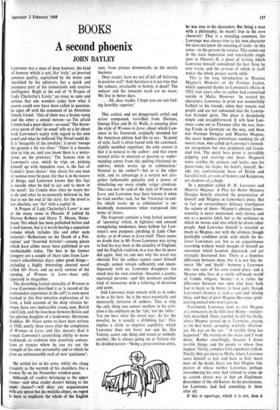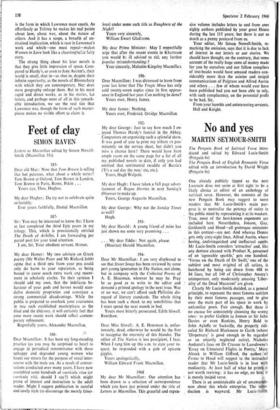A second phoenix BOOKS
JOHN BAYLEY
Lawrence was a man of deep humour, the kind of humour which is not, like 'style,' an inverted commas quality, capitalised by the writer and cherished by his admirers, but a quick and necessary part of his iconoclastic and creative intelligence. Right at the end of 'A Propos of Lady Chatterley's Lover,' an essay so sane and serious that one wonders today how what it asserts could ever have been called in question, he signs off with the comment of an American female friend: 'One of them was a brainy vamp and the other a sexual moron—so I'm afraid Connie had a poor choice—as usual.' The throw- away quote of that 'as usual' tells us a lot about both Lawrence's sanity with regard to his own novel and what he believed The Novel could do. It is 'incapable of the absolute'; it never 'sweeps the ground a bit too clear.' There is a banana skin to trip on, and you know there is a water- closet on the premises.' The banana skin in Lawrence's case, which he trips on, picking himself up with impudent ease, is the fact of Connie's 'poor choice.' Any choice for any man or woman must be poor, for that is in the nature of things, and Lawrence knows that this fact is outside what he had to say and to show in the novel: his Connie does what he wants her to do and what he passionately believed in, but that is not the end of the story, for the novel is not absolute, not 'Art' with a capital A.
'A Propos of Lady Chatterley's Lover' is one of the many items in Phoenix ll (edited by Warren Roberts and Harry T. Moore, Heine- mann 7.0s) which has been published before and is well known, but it is worth having a capacious volume which includes this and other such material—'Reflections on the Death of a Por- cupine' and 'Assorted Articles'—among pieces which have either never been published or are unobtainable today. The best in the former category are-a couple of short tales from Law- rence's schoolmaster days; other good things— including a highly interesting aborted novel called Mr Noon, and an early version of the opening of Women in Love—have only appeared in magazines.
The disturbing factual unreality of Women in Love (Lawrence described it as 'a record of the profoundest experience in the self') is even more marked in this first tentative exploration of its form, a bald account of the deep relation be- tween those two implausible young man, Birkin and Crich, and the love-hate between Birkin and the adoring daughter of a landowner, Hermione Roddice. Mr Noon seems to have been written in 1920, nearly three years after the completion of Women in Love, and like Aaron's Rod it reveals Lawrence's astonishing ability to move .
backwards or crabwise into novelistic conven- tions or stances where he can try out the strength of his own personality and to which he gives an unforeseeable rush of new 'quickness': 'He settled her in his arms, whilst she clung dreamily to the warmth of his shoulders, like a drowsy fly on the November window-pane.
Although all readers belonging to the upper classes—and what reader. doesn't belong to the upper classes?—will deny any acquaintance with any spoon but the metallic object, we regret to have to implicate the whole of the English
race, from princes downwards, in the mystic business.
Dear reader, have we not all left off believing in positive evil? And therefore is it not true that the seducer, invaluable to fiction, is dead? The seducer and the innocent maid are no more. We live in better days.
. . . Ah, dear reader, I hope you are not feel- ing horribly superior.'
This archaic and yet dangerously artful and active compound, revivified from Dickens, George Eliot and H. G. Wells, is amazing after the style of Women in Love, about which Law- rence in his foreword, originally intended for the American edition, had this to say: 'In point of style, fault is often found with the continual, slightly modified repetition; the only answer is that it is natural to the author: and that every natural crisis in emotion-or passion or under- standing comes from this pulsing frictional to- and-fro, which works up to culmination.' Natural to the author?—but so is the other style, and its advantage is a certain not alto- gether fathomable geniality and a power of stimulating our more simple, vulgar attention. That can not be said of the style of Women in Love, and Lawrence may have known it when he tried another tack, for the 'frictional to-and- fro which works up to culmination' is un- doubtedly monotonous when transposed into terms of letters.
The fragment contains a long lyrical account of 'spooning' which, in lightness and amused evangelising tenderness, beats hollow for Law- rence's own purposes anything in Lady Chat- terley, or in Women in Love itself. There seems no doubt that in Mr Noon Lawrence was trying to find his way back to the actuality of England, and the English tradition, in a way that he never did again. And yet one sees why the novel was aborted. For the author cannot assert himself enough; cannot remain sufficiently and unam- biguously with us. Lawrence disappears too much into his own creation—becomes a jaunty, equivocal persona—and this produces another kind of monotony with a faltering of direction and point.
And Lawrence must remain with us in order to be at his best: he is the most essentially and necessarily intrusive of authors. That is why the only thing one cannot swallow in his criti- cism is his emphasis on the 'tale,' not the 'teller.' 'Let me hear what the novel says. As for the novelist, he is usually a dribbling liar.' This implies a claim to negative capability which Lawrence does not have; nor can he, like Tolstoy, assert one thing and reveal or embody another. He is always going on at Tolstoy for his divided nature—'being a great creative artist,
he was true to his characters. But beim/ a man with a philosophy, he wasn't true to his own character.' That is a revealing comment, for . Lawrenqe was always true to his own character but does not know the meaning of truth—in this sense—to the persons he creates. This comes out in the most impressive and remarkable single item in Phoenix II, a piece of writing which Lawrence himself considered the best thing he ever wrote, and the re-issue of which in itself makes the whole project worth while.
This is the long introduction to Maurice Magnus's Memoirs of the Foreign Legion, which appeared thanks to Lawrence's efforts in 1924, four years after its author had committed suicide in Malta. However he treated his characters, Lawrence in print was wonderfully faithful to his friends, when they remain real people and are not subsumed into the Lawren- tian fictional guise. The piece is deceptively simple and straightforward. It tells how Law- rence came out to Florence after the war, leav- ing Frieda in Germany. on the way, and there met Norman Douglas and Maurice Magnus, this queer hopeless pretentious touching (in all senses) man, who called up Lawrence's immedi- ate antagonism but also perplexed and fascin- ated him. The quick bare prose is incredibly gripping and exciting—one hears Magnus's voice, catches his gestures and looks; sees his possessions, his hopes, his beliefs, himself. Be- side this confrontation those of Birkin and Gerald Crich, or even of Somers and Kangaroo, are shadows of a shade.
In a pamphlet called D. H. Lawrence and Maurice Magnus: A Plea for Better Manners Douglas bitterly attacked the presentation of himself and Magnus in Lawrence's piece. But in fact an extraordinary delicacy transfigures the seizure of them—Magnus's obvious homo- sexuality is never mentioned, only shown, and not as a positive label, but as the ambience in which he moves and into which he draws other people. And Lawrence himself is revealed as much as Magnus, not with the ultimate though justifiably confident pride with which the fic- tional tawrences are, but as an acquaintance recording without much thought- of himself an encounter which haunted, depressed, and yet
strangely heartened him. There is a hopeless difference between them, but it is not that be- tween 'life' and 'death'—between a Lawrence
who was sure of his own rooted place, and #
Magnus who lives in a sterile self-made world of friends, religion, 'beauty'—it is rather the difference between two men who have both had to learn to be brave, to have guts; though Lawrence's bravery is such a sane and shining thing. and that of poor Magnus like some spirit- craving animal who won't give in.
Fascinated, Lawrence went to visit Magnus at a monastery in the hills near Rome—wonder- fully described. Then, repelled, he left for Sicily, where Magnus turned up at Taormina, staying • at the best hotel, sponging, woefully affection- ate. He was on the run. '"A terrible thing has happened." He waited on the stairs and I went down. Rather unwillingly, because I detest terrible things, and the people to whom they happen.' Gritty, complex little expedients follow.
Finally they get away to Malta, where Lawrence saves himself at last, and back in Italy hears news of the death; hears too that Magnus (the picture of whose mother Lawrence, perhaps remembering his own, had refused to come up
to scratch about) was in fact an illegitimate descendant of the old Kaiser. So his pretensions, for Lawrence, had had something in them after alL If this is reportage, which it is not, then it
is the form in which Lawrence most excels. As effortlessly as Tolstoy he makes his real points about love, about war, about the nature of others. And it has a scope, a breadth of un- strained implication, which is rare in Lawrence's work and which—one must repeat—makes Women in Love look like a claustropNob:c fairy story.
The strang thing about his later novels is that they give little impression of space. Com- pared to Hardy's, or even to Jane Austen's, their world is small, shut in—as shut in, despite their infinite superiority, as the novels of Bloomsbury with which they are contemporary. Nor does mere geography enlarge them. But in his most rapid and direct works, as in his stories, his letters, and perhaps most of all in this rfinark- able introduction, we see the real size that Lawrence was, though the form of such master- pieces makes no visible effort to claim it.



































 Previous page
Previous page